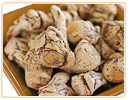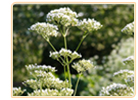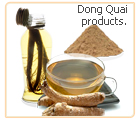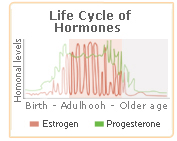Dong Quai
Dong Quai (Angelica Sinensis) is a perennial plant that is found at high altitudes in the mountainous regions of Japan, China and Korea. The thick, light brown root of the Dong Quai herb has been valued for thousands of years for its vast array of medicinal applications.
What is Dong Quai
 Dong quai is most commonly used to treat gynecological problems. This "female herb" or herb for menopause has been used for centuries in traditional Chinese medicine because its phytoestrogenic properties can stabilize female hormone levels, easing a great deal of menopausal and menstrual symptoms. Dong quai is most commonly used to treat gynecological problems. This "female herb" or herb for menopause has been used for centuries in traditional Chinese medicine because its phytoestrogenic properties can stabilize female hormone levels, easing a great deal of menopausal and menstrual symptoms.
Dong quai can be used to treat blood disorders and also works as a mild sedative, a stress and anxiety reliever and a mild laxative.
Origins of Dong Quai
A member of the celery family, Dong quai is often referred to as "the female ginseng" for its restorative properties.
Different Names of Dong Quai (Synonyms)
Angelica Sinensis is the European name for Dong Quai. Other synonyms include Chinese angelica, dang gui, tang kuei, toki and tanggwi.
Pharmacology and Chemical Composition
Dong quai contains anticoagulant (blood thinning) properties, enabling it to function as a blood tonic. The chemical composition of Dong quai also increases the photosensitivity of the skin, so it’s important that users stay out of the sun.
How does Dong Quai Grow
 Dong quai is a root that grows in damp, high altitudes of China and other parts of Asia. Flowers bloom in June and July and its fruit starts to develop in July and August. Dong quai is a root that grows in damp, high altitudes of China and other parts of Asia. Flowers bloom in June and July and its fruit starts to develop in July and August.
What does Dong Quai Look Like
Dong quai blooms fragrant white, umbrella-shaped flowers with five rounded petals in the summer months. The stem is smooth and purple.
Click on the following link to read more about Dong quai, or continue reading below to learn about how it works.
How Does Dong Quai Work?
A Few Properties of Dong Quai
Analgesic
Anti-inflammatory
Antispasmodic
Blood Tonic
Diuretic
Emmenagogue
Sedative
Dong Quai increases levels of estrogen (a hormone that plays a key role in several bodily functions) by substituting natural human hormones with plant hormones called phytoestrogens, which have a chemical structure very similar to estrogen. Dong quai contains many curative properties. A few are listed below.
Phytoestrogens: This property of Dong quai balances out hormone levels, enhancing estrogen when levels are too low and competing with estrogen when levels are too high. This is a main reason it aids in gynecological issues.
Metabolic Actions: Dong quai increases metabolism and may contain vitamin B-12 and folic acid.
Immune System Strengthening Properties: Dong quai may have an anti-allergy property as well as the ability to produce protein, stimulate lymphocytes and enhance white blood cell activity.
How Dong Quai Works on the Body:
Dong quai works primarily as a tonic in the blood, nourishing cells, tissues and organs, focusing on the hormonal and immune systems. It also prevents blood clots and has anti-inflammatory properties as it contains courmarin.
Click on the following link to read more about how dong quai works, or continue reading to discover its uses.
Uses of Dong Quai
Dong quai has been used for thousands of years in traditional Chinese medicine. Due to its gynecological benefits, interest in the herb has been revived.
Traditional Uses of Dong Quai
As a tonic, Dong quai was used to regulate hormone levels which are the main cause of menstrual and menopausal problems. It was also used as a blood tonic, for both genders, to nourish the blood and boost circulation.
Modern Uses of Dong Quai
 Women take this herb to regulate their menstrual flow after stopping the use of birth control or after having a baby. It can also restore hormone balance and ease the many symptoms of menopause. Women take this herb to regulate their menstrual flow after stopping the use of birth control or after having a baby. It can also restore hormone balance and ease the many symptoms of menopause.
As a blood tonic, it is used to maintain blood pressure, prevent iron deficiency, relieve stress, cure insomnia and constipation, and prevent hepatitis and cirrhosis.
Different Dong Quai Products
Dong quai comes in a variety of forms including pills, powder, dried root slices or dried leaf, liquid, tinctures, tea or in topical formation.
Dosage of Dong Quai
Dong quai dosage has yet to be determined but it is suggested that standardized extracts, tinctures, and solid formulations of Dong quai should provide a reliable dose of the herb.
Overdose
Dong quai overdose symptoms remain unknown. One should consult their primary healthcare provider before taking Dong quai and discuss an appropriate dosage.
Click here to learn more about Dong quai uses, or continue reading to find out its benefits.
Dong Quai Benefits
 Dong quai is known to alleviate painful menstrual flow, normalize irregular periods, and regulate a woman's period after discontinued use of an oral contraceptive. It is sometimes used to promote blood circulation, stabilize blood pressure, and to dilate peripheral blood vessels. Dong quai is rich in iron and can also help prevent iron deficiencies and anemia. Dong quai is known to alleviate painful menstrual flow, normalize irregular periods, and regulate a woman's period after discontinued use of an oral contraceptive. It is sometimes used to promote blood circulation, stabilize blood pressure, and to dilate peripheral blood vessels. Dong quai is rich in iron and can also help prevent iron deficiencies and anemia.
Benefits Related to Specific Ailments:
Dong quai is known to cure headaches, both mild and traumatic injuries, and alleviate insomnia and constipation.
Click here to learn more about Dong quai benefits, or continue reading to find out about its side effects.
Dong Quai Side Effects
 Like all treatments, Dong quai comes with its own list of potential side effects, precautions and warnings in varying degrees of severity. It is important to note however that further research is needed to determine concrete side effects of Dong quai usage. Like all treatments, Dong quai comes with its own list of potential side effects, precautions and warnings in varying degrees of severity. It is important to note however that further research is needed to determine concrete side effects of Dong quai usage.
Quick Overview Of Potential Side Effects of Dong Quai
Should not be combined with certain herbal supplements or treatments or pharmaceutical treatments.
Strong cautionary advisement for pregnant or nursing women.
Not safe for children.
May increase the risk of breast cancer
Warnings
Dong quai should not be combined with other herbs or medications, especially other blood thinning treatments. Dong quai may also increase the risk of breast cancer.
Side Effects
The most common side effects of Dong quai include increased photosensitivity, headaches, dizziness, nausea, vomiting, diarrhea and enlarged breasts in men.
Dong Quai Substitutes
A few of Dong quai’s side effects are a result of the estrogen that the herb contains. There are other natural remedies known as non-estrogenic herbs that do not contain estrogen but provide the same relief as Dong quai.
Click on the following link to read more about the side effects of Dong quai or read on to find out Dong quai and menopause.
Dong Quai and Menopause
 Because of its apparent estrogenic properties, Dong quai is known to alleviate a plethora of menopausal symptoms. With hormonal imbalance, women can experience mood swings, hot flashes and night sweats, among other symptoms. Because of its apparent estrogenic properties, Dong quai is known to alleviate a plethora of menopausal symptoms. With hormonal imbalance, women can experience mood swings, hot flashes and night sweats, among other symptoms.
Dong quai has the ability to regulate hormone imbalance because it contains phytoestrogens (a component that mimics or acts as an antagonist to estrogen).
Click here to learn more about Dong quai and menopause.
Conclusions about Dong Quai
Dong Quai is great at relieving many menopause symptoms, but Dong Quai has been criticized because it adds artificial hormones to the body. In so doing, Dong Quai can trigger a variety of undesirable side effects, including serious problems like breast cancer.
It is possible to find other alternative treatments which are just as effective as Dong Quai, but without the side effects. Non-estrogenic herbs, for example, are a great option for treating menopause symptoms. Read more in the following article.
Which herb should women try? Today women are looking for relief from their menopause symptoms with herbs. Phytoestrogenic herbs and non-estrogenic herbs are good in relieving menopause symptoms, but recent studies show that non-estrogenic herbs have no side effects because they help the body to produce its own hormones instead of introducing hormones like the phytoestrogenic ones. Learn more about non-estrogenic herbs for menopause.
| 

